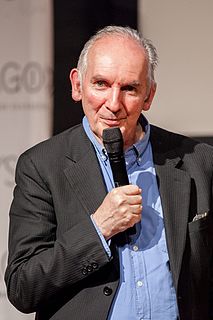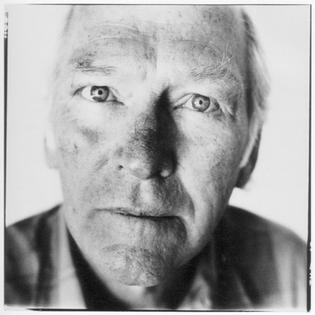A Quote by Alan Watts
The myths underlying our culture and underlying our common sense have not taught us to feel identical with the universe, but only parts of it, only in it, only confronting it - aliens... within I don't know how many years, but in not too long a time, it's going to become basic common sense that you are not some alien being who confronts an external world that is not you, but that almost every intelligent person will have the feeling of being an activity of the entire universe.
Quote Topics
Activity
Alien
Aliens
Almost
Basic
Become
Being
Common
Common Sense
Confronting
Culture
Entire
Every
External
Feel
Feeling
Going
How
Identical
Intelligent
Intelligent Person
Know
Know How
Long
Many
Myths
Only
Our
Parts
Person
Sense
Some
Taught
Taught Us
Time
Too
Underlying
Universe
Us
Will
Within
World
Years
Related Quotes
Common sense! It's nothing more than common sense for the preservation of our culture, the preservation of our country, the preservation and growth of our economy. And yet Jim Acosta and Glenn Thrush - and everybody in the press corps and practically every other Democrat - hears this and the only reaction they have is, "No compassion! No compassion for the less fortunate! No compassion for the victims of the world!"
If all our common-sense notions about the universe were correct, then science would have solved the secrets of the universe thousands of years ago. The purpose of science is to peel back the layer of the appearance of the objects to reveal their underlying nature. In fact, if appearance and essence were the same thing, there would be no need for science.
Although you can find certain differences among the Buddhist philosophical schools about how the universe came into being, the basic common question addressed is how the two fundamental principles-external matter and internal mind or consciousness-although distinct, affect one another. External causes and conditions are responsible for certain of our experiences of happiness and suffering. Yet we find that it is principally our own feelings, our thoughts and our emotions, that really determine whether we are going to suffer or be happy.
The power of both myth and art is this magical ability to open doors, to make connections - not only between us and the natural world, but between us and the rest of humanity. Myths show us what we have in common with every other human being, no matter what culture we come from, no matter what century we live in. . .and at the same time, mythic stories and art celebrate our essential differences.
What a dull universe it would be if everything in it conformed to our expectations, if it held nothing to surprise or baffle us or confound our common sense. A century ago no one foresaw the existence of black holes, an expanding universe, oceans on Jupiter's moons, or DNA. What could be more enriching than to know that we share a common origin with all living things, that we are kin to chimpanzees, redwoods and mollusks? And isn't it a source of wonder to realize that the iron in our blood and the calcium in our bones were created in the bellies of supernovas?
There was an enjoyment to being alive, he felt, that because of an underlying meaninglessness–like how a person alone for too long cannot feel comfortable when with others; cannot neglect that underlying the feeling of belongingness is the certainty, really, of loneliness, and nothingness, and so experiences life in that hurried, worthless way one experiences a mistake–he could no longer get at.
If we've learned any lessons during the past few decades, perhaps the most important is that preservation of our environment is not a partisan challenge; it's common sense. Our physical health, our social happiness, and our economic well-being will be sustained only by all of us working in partnership as thoughtful, effective stewards of our natural resources.
Many expressions that are in common usage, and sometimes the structure of language itself, reveal the fact that people don't know who they are. You say: "He lost his life" or "my life," as if life were something that you can possess or lose. The truth is: you don't have a life, you are life. The One Life, the one consciousness that pervades the entire universe and takes temporary form to experience itself as a stone or blade of grass, as an animal, a person, a star or a galaxy. Can you sense deep within that you already know that? Can you sense that you already are That?
If we only arrange our life in accordance with the principle which tells us that we must always trust in the difficult, then what now appears to us as the most alien will become our most intimate and trusted experience. How could we forget those ancient myths that stand at the beginning of all races, the myths about dragons that at the last moment are transformed into princesses? Perhaps all the dragons in our lives are princesses who are only waiting to see us act, just once, with beauty and courage.
The dominant metaphor of conceptual relativism, that of differing points of view, seems to betray an underlying paradox. Differentpoints of view make sense, but only if there is a common co-ordinate system on which to plot them; yet the existence of a common system belies the claim of dramatic incomparability.
. . . Newton was an unquestioning believer in an all-wise creator of the universe, and in his own inability - like the boy on the seashore - to fathom the entire ocean in all its depths. He therefore believed that there were not only many things in heaven beyond his philosophy, but plenty on earth as well, and he made it his business to understand for himself what the majority of intelligent men of his time accepted without dispute (to them it was as natural as common sense) - the traditional account of the creation.








































